Tesco's Internationalization: Strategy, Challenges & EEC Analysis
VerifiedAdded on 2023/06/12
|18
|5186
|140
Report
AI Summary
This report provides an in-depth analysis of the internationalization strategies employed by Multinational Corporations (MNCs), with a specific focus on Tesco's planned expansion into New Zealand. It begins by examining the European Economic Community (EEC), detailing its pros and cons, including the benefits of a single market and free movement of people, alongside the challenges of high membership costs and policy discrepancies. The report then explores the reasons behind MNC internationalization, such as increasing sales and profitability, achieving economies of scale, entering new markets, attracting new talent, gaining a competitive edge, and fostering business growth. It also addresses the challenges faced by MNCs when going international, including market imperfections, additional costs, and cultural differences. Furthermore, the report includes an individual analysis of the domestic market, outlines an internationalization strategy for Tesco, discusses the mode of entry into New Zealand, potential challenges, and possible solutions. The study concludes with a reflection on the learnings from the module, emphasizing the importance of strategic planning and adaptability in international business ventures, and providing insights into the complexities and opportunities associated with global expansion. Desklib provides access to similar solved assignments and study resources.

Individual Report
Paraphrase This Document
Need a fresh take? Get an instant paraphrase of this document with our AI Paraphraser
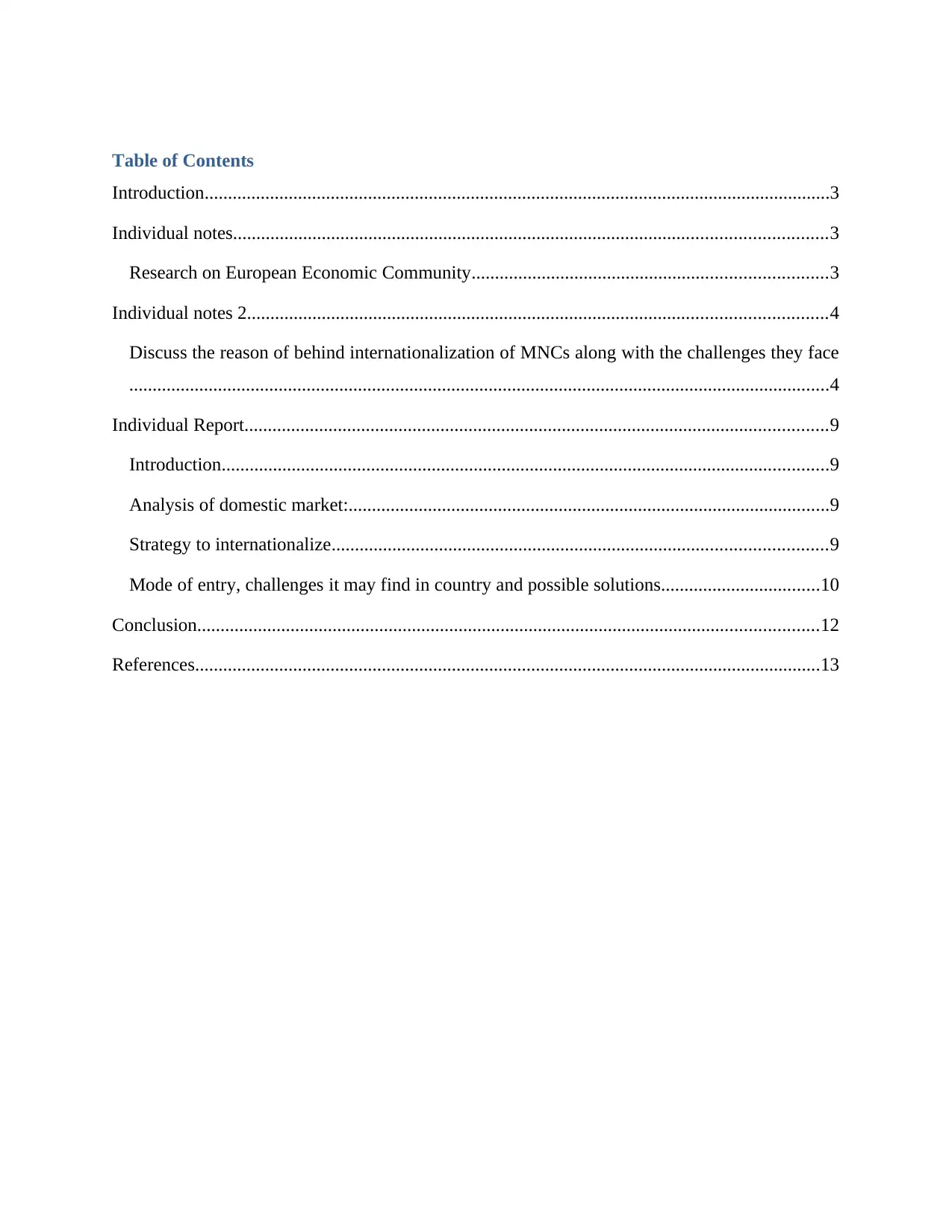
Table of Contents
Introduction......................................................................................................................................3
Individual notes...............................................................................................................................3
Research on European Economic Community............................................................................3
Individual notes 2............................................................................................................................4
Discuss the reason of behind internationalization of MNCs along with the challenges they face
......................................................................................................................................................4
Individual Report.............................................................................................................................9
Introduction..................................................................................................................................9
Analysis of domestic market:.......................................................................................................9
Strategy to internationalize..........................................................................................................9
Mode of entry, challenges it may find in country and possible solutions..................................10
Conclusion.....................................................................................................................................12
References......................................................................................................................................13
Introduction......................................................................................................................................3
Individual notes...............................................................................................................................3
Research on European Economic Community............................................................................3
Individual notes 2............................................................................................................................4
Discuss the reason of behind internationalization of MNCs along with the challenges they face
......................................................................................................................................................4
Individual Report.............................................................................................................................9
Introduction..................................................................................................................................9
Analysis of domestic market:.......................................................................................................9
Strategy to internationalize..........................................................................................................9
Mode of entry, challenges it may find in country and possible solutions..................................10
Conclusion.....................................................................................................................................12
References......................................................................................................................................13
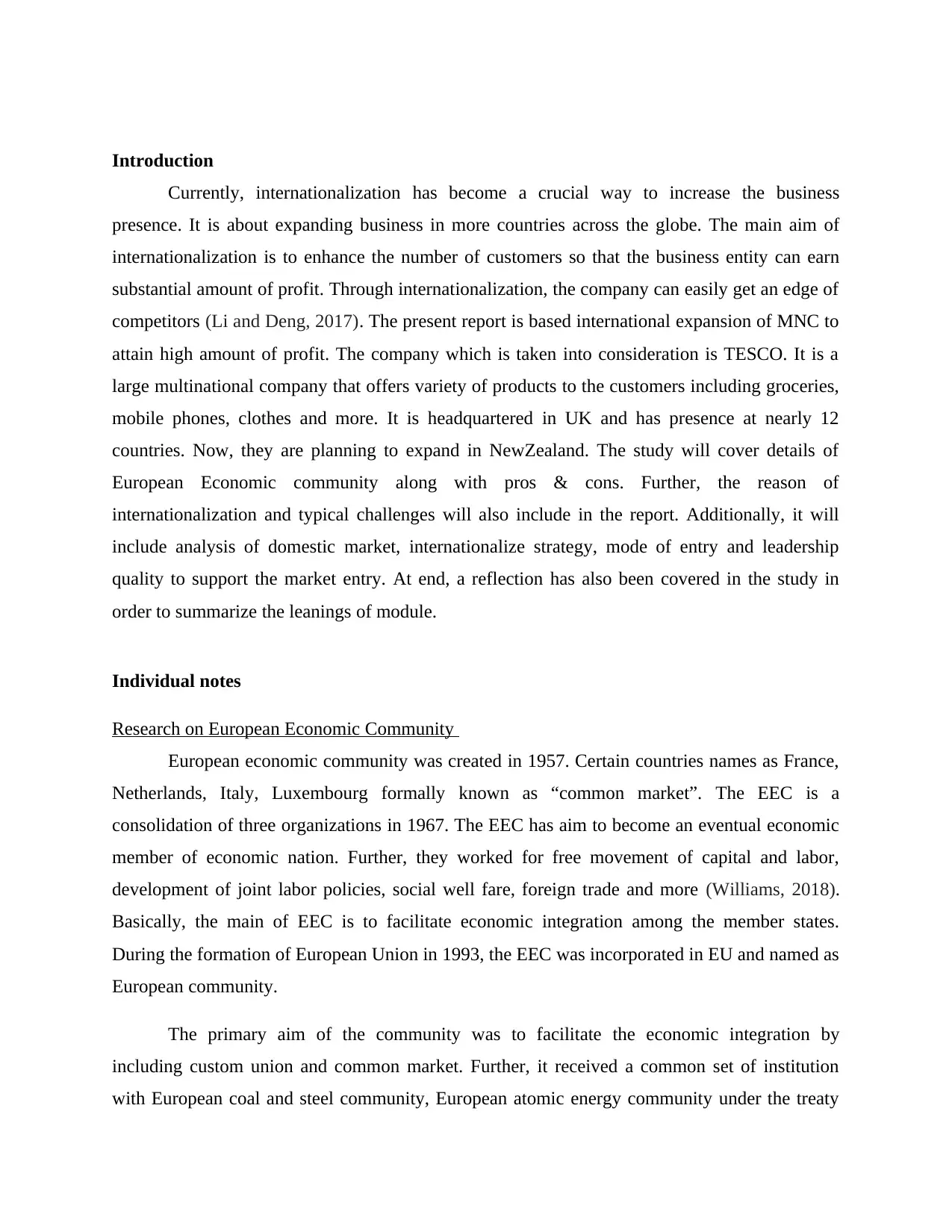
Introduction
Currently, internationalization has become a crucial way to increase the business
presence. It is about expanding business in more countries across the globe. The main aim of
internationalization is to enhance the number of customers so that the business entity can earn
substantial amount of profit. Through internationalization, the company can easily get an edge of
competitors (Li and Deng, 2017). The present report is based international expansion of MNC to
attain high amount of profit. The company which is taken into consideration is TESCO. It is a
large multinational company that offers variety of products to the customers including groceries,
mobile phones, clothes and more. It is headquartered in UK and has presence at nearly 12
countries. Now, they are planning to expand in NewZealand. The study will cover details of
European Economic community along with pros & cons. Further, the reason of
internationalization and typical challenges will also include in the report. Additionally, it will
include analysis of domestic market, internationalize strategy, mode of entry and leadership
quality to support the market entry. At end, a reflection has also been covered in the study in
order to summarize the leanings of module.
Individual notes
Research on European Economic Community
European economic community was created in 1957. Certain countries names as France,
Netherlands, Italy, Luxembourg formally known as “common market”. The EEC is a
consolidation of three organizations in 1967. The EEC has aim to become an eventual economic
member of economic nation. Further, they worked for free movement of capital and labor,
development of joint labor policies, social well fare, foreign trade and more (Williams, 2018).
Basically, the main of EEC is to facilitate economic integration among the member states.
During the formation of European Union in 1993, the EEC was incorporated in EU and named as
European community.
The primary aim of the community was to facilitate the economic integration by
including custom union and common market. Further, it received a common set of institution
with European coal and steel community, European atomic energy community under the treaty
Currently, internationalization has become a crucial way to increase the business
presence. It is about expanding business in more countries across the globe. The main aim of
internationalization is to enhance the number of customers so that the business entity can earn
substantial amount of profit. Through internationalization, the company can easily get an edge of
competitors (Li and Deng, 2017). The present report is based international expansion of MNC to
attain high amount of profit. The company which is taken into consideration is TESCO. It is a
large multinational company that offers variety of products to the customers including groceries,
mobile phones, clothes and more. It is headquartered in UK and has presence at nearly 12
countries. Now, they are planning to expand in NewZealand. The study will cover details of
European Economic community along with pros & cons. Further, the reason of
internationalization and typical challenges will also include in the report. Additionally, it will
include analysis of domestic market, internationalize strategy, mode of entry and leadership
quality to support the market entry. At end, a reflection has also been covered in the study in
order to summarize the leanings of module.
Individual notes
Research on European Economic Community
European economic community was created in 1957. Certain countries names as France,
Netherlands, Italy, Luxembourg formally known as “common market”. The EEC is a
consolidation of three organizations in 1967. The EEC has aim to become an eventual economic
member of economic nation. Further, they worked for free movement of capital and labor,
development of joint labor policies, social well fare, foreign trade and more (Williams, 2018).
Basically, the main of EEC is to facilitate economic integration among the member states.
During the formation of European Union in 1993, the EEC was incorporated in EU and named as
European community.
The primary aim of the community was to facilitate the economic integration by
including custom union and common market. Further, it received a common set of institution
with European coal and steel community, European atomic energy community under the treaty
⊘ This is a preview!⊘
Do you want full access?
Subscribe today to unlock all pages.

Trusted by 1+ million students worldwide
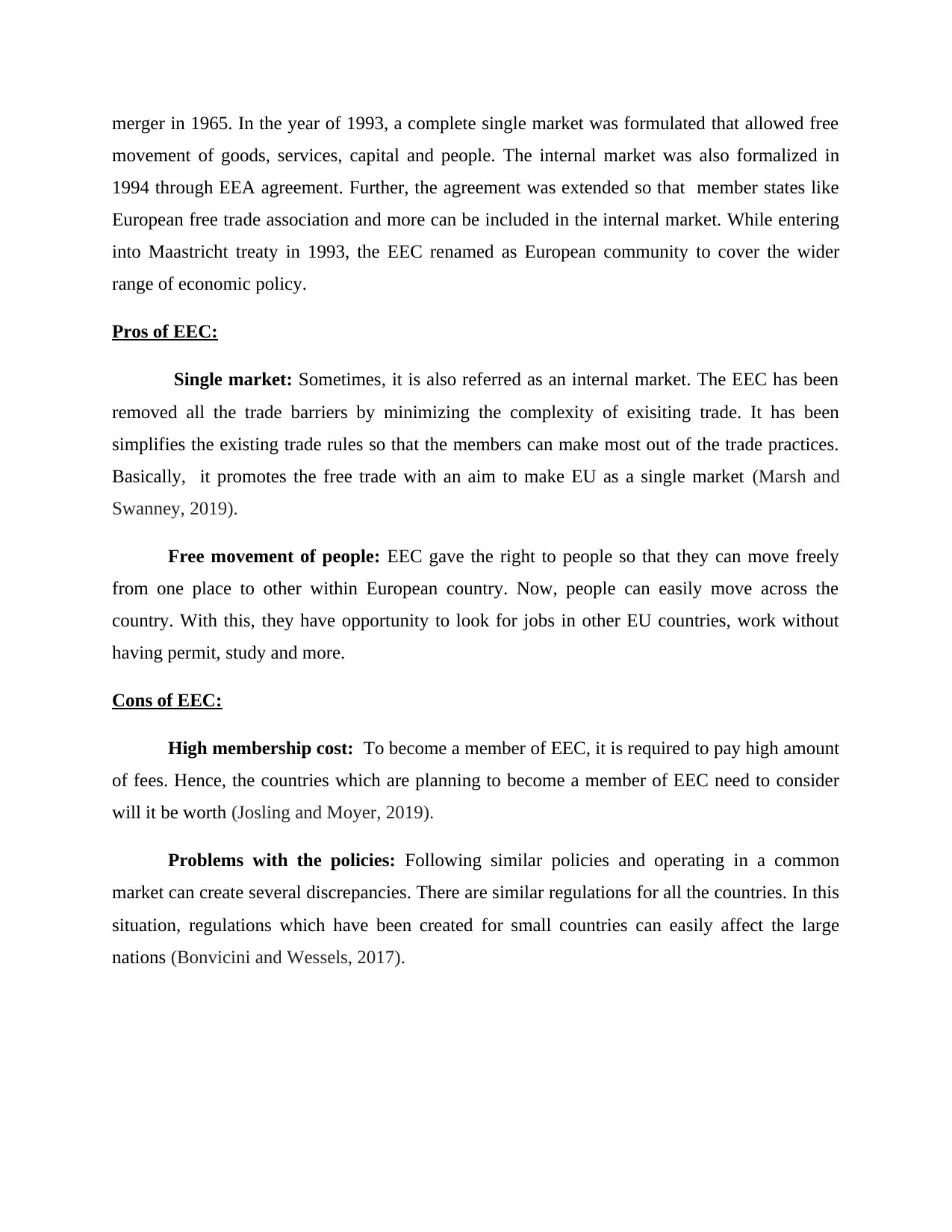
merger in 1965. In the year of 1993, a complete single market was formulated that allowed free
movement of goods, services, capital and people. The internal market was also formalized in
1994 through EEA agreement. Further, the agreement was extended so that member states like
European free trade association and more can be included in the internal market. While entering
into Maastricht treaty in 1993, the EEC renamed as European community to cover the wider
range of economic policy.
Pros of EEC:
Single market: Sometimes, it is also referred as an internal market. The EEC has been
removed all the trade barriers by minimizing the complexity of exisiting trade. It has been
simplifies the existing trade rules so that the members can make most out of the trade practices.
Basically, it promotes the free trade with an aim to make EU as a single market (Marsh and
Swanney, 2019).
Free movement of people: EEC gave the right to people so that they can move freely
from one place to other within European country. Now, people can easily move across the
country. With this, they have opportunity to look for jobs in other EU countries, work without
having permit, study and more.
Cons of EEC:
High membership cost: To become a member of EEC, it is required to pay high amount
of fees. Hence, the countries which are planning to become a member of EEC need to consider
will it be worth (Josling and Moyer, 2019).
Problems with the policies: Following similar policies and operating in a common
market can create several discrepancies. There are similar regulations for all the countries. In this
situation, regulations which have been created for small countries can easily affect the large
nations (Bonvicini and Wessels, 2017).
movement of goods, services, capital and people. The internal market was also formalized in
1994 through EEA agreement. Further, the agreement was extended so that member states like
European free trade association and more can be included in the internal market. While entering
into Maastricht treaty in 1993, the EEC renamed as European community to cover the wider
range of economic policy.
Pros of EEC:
Single market: Sometimes, it is also referred as an internal market. The EEC has been
removed all the trade barriers by minimizing the complexity of exisiting trade. It has been
simplifies the existing trade rules so that the members can make most out of the trade practices.
Basically, it promotes the free trade with an aim to make EU as a single market (Marsh and
Swanney, 2019).
Free movement of people: EEC gave the right to people so that they can move freely
from one place to other within European country. Now, people can easily move across the
country. With this, they have opportunity to look for jobs in other EU countries, work without
having permit, study and more.
Cons of EEC:
High membership cost: To become a member of EEC, it is required to pay high amount
of fees. Hence, the countries which are planning to become a member of EEC need to consider
will it be worth (Josling and Moyer, 2019).
Problems with the policies: Following similar policies and operating in a common
market can create several discrepancies. There are similar regulations for all the countries. In this
situation, regulations which have been created for small countries can easily affect the large
nations (Bonvicini and Wessels, 2017).
Paraphrase This Document
Need a fresh take? Get an instant paraphrase of this document with our AI Paraphraser
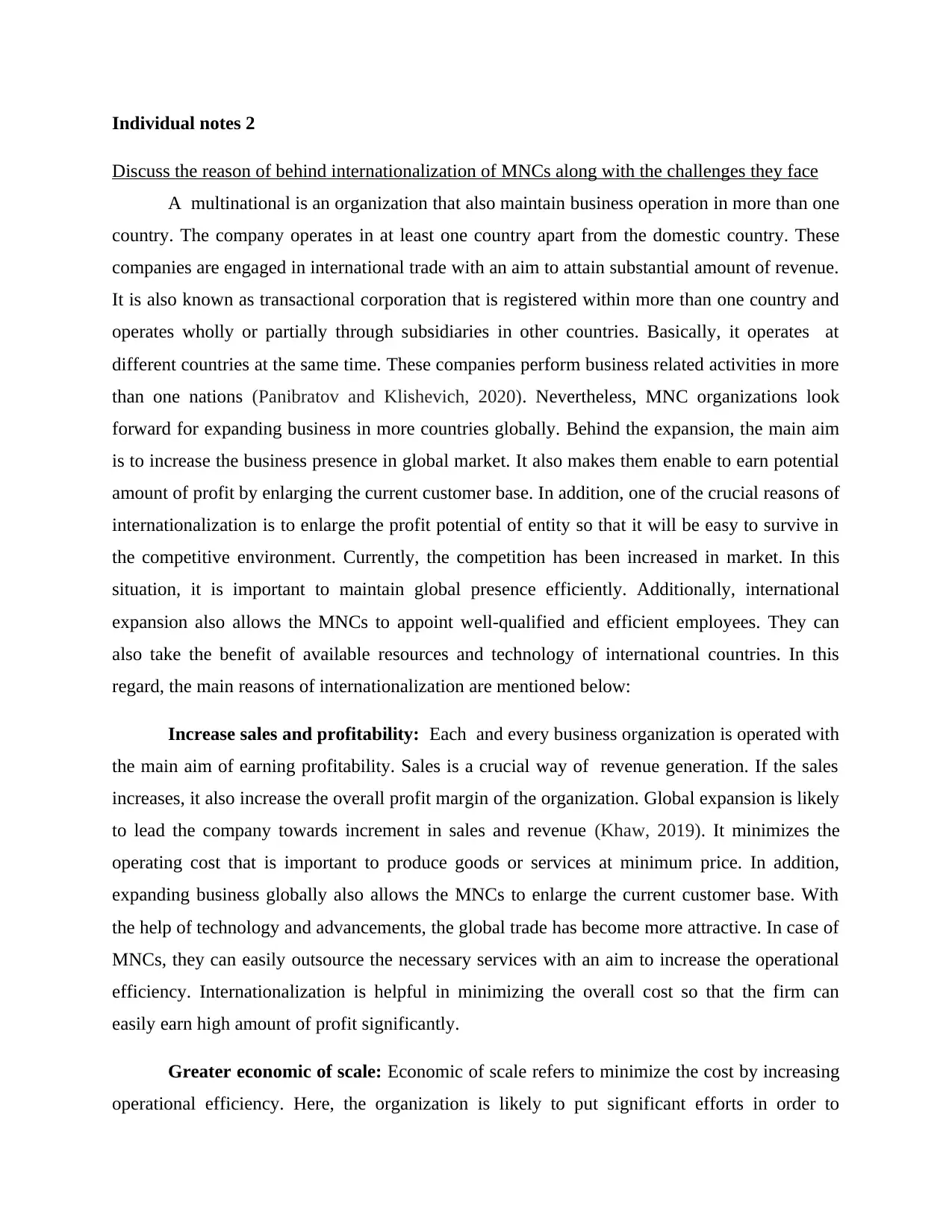
Individual notes 2
Discuss the reason of behind internationalization of MNCs along with the challenges they face
A multinational is an organization that also maintain business operation in more than one
country. The company operates in at least one country apart from the domestic country. These
companies are engaged in international trade with an aim to attain substantial amount of revenue.
It is also known as transactional corporation that is registered within more than one country and
operates wholly or partially through subsidiaries in other countries. Basically, it operates at
different countries at the same time. These companies perform business related activities in more
than one nations (Panibratov and Klishevich, 2020). Nevertheless, MNC organizations look
forward for expanding business in more countries globally. Behind the expansion, the main aim
is to increase the business presence in global market. It also makes them enable to earn potential
amount of profit by enlarging the current customer base. In addition, one of the crucial reasons of
internationalization is to enlarge the profit potential of entity so that it will be easy to survive in
the competitive environment. Currently, the competition has been increased in market. In this
situation, it is important to maintain global presence efficiently. Additionally, international
expansion also allows the MNCs to appoint well-qualified and efficient employees. They can
also take the benefit of available resources and technology of international countries. In this
regard, the main reasons of internationalization are mentioned below:
Increase sales and profitability: Each and every business organization is operated with
the main aim of earning profitability. Sales is a crucial way of revenue generation. If the sales
increases, it also increase the overall profit margin of the organization. Global expansion is likely
to lead the company towards increment in sales and revenue (Khaw, 2019). It minimizes the
operating cost that is important to produce goods or services at minimum price. In addition,
expanding business globally also allows the MNCs to enlarge the current customer base. With
the help of technology and advancements, the global trade has become more attractive. In case of
MNCs, they can easily outsource the necessary services with an aim to increase the operational
efficiency. Internationalization is helpful in minimizing the overall cost so that the firm can
easily earn high amount of profit significantly.
Greater economic of scale: Economic of scale refers to minimize the cost by increasing
operational efficiency. Here, the organization is likely to put significant efforts in order to
Discuss the reason of behind internationalization of MNCs along with the challenges they face
A multinational is an organization that also maintain business operation in more than one
country. The company operates in at least one country apart from the domestic country. These
companies are engaged in international trade with an aim to attain substantial amount of revenue.
It is also known as transactional corporation that is registered within more than one country and
operates wholly or partially through subsidiaries in other countries. Basically, it operates at
different countries at the same time. These companies perform business related activities in more
than one nations (Panibratov and Klishevich, 2020). Nevertheless, MNC organizations look
forward for expanding business in more countries globally. Behind the expansion, the main aim
is to increase the business presence in global market. It also makes them enable to earn potential
amount of profit by enlarging the current customer base. In addition, one of the crucial reasons of
internationalization is to enlarge the profit potential of entity so that it will be easy to survive in
the competitive environment. Currently, the competition has been increased in market. In this
situation, it is important to maintain global presence efficiently. Additionally, international
expansion also allows the MNCs to appoint well-qualified and efficient employees. They can
also take the benefit of available resources and technology of international countries. In this
regard, the main reasons of internationalization are mentioned below:
Increase sales and profitability: Each and every business organization is operated with
the main aim of earning profitability. Sales is a crucial way of revenue generation. If the sales
increases, it also increase the overall profit margin of the organization. Global expansion is likely
to lead the company towards increment in sales and revenue (Khaw, 2019). It minimizes the
operating cost that is important to produce goods or services at minimum price. In addition,
expanding business globally also allows the MNCs to enlarge the current customer base. With
the help of technology and advancements, the global trade has become more attractive. In case of
MNCs, they can easily outsource the necessary services with an aim to increase the operational
efficiency. Internationalization is helpful in minimizing the overall cost so that the firm can
easily earn high amount of profit significantly.
Greater economic of scale: Economic of scale refers to minimize the cost by increasing
operational efficiency. Here, the organization is likely to put significant efforts in order to
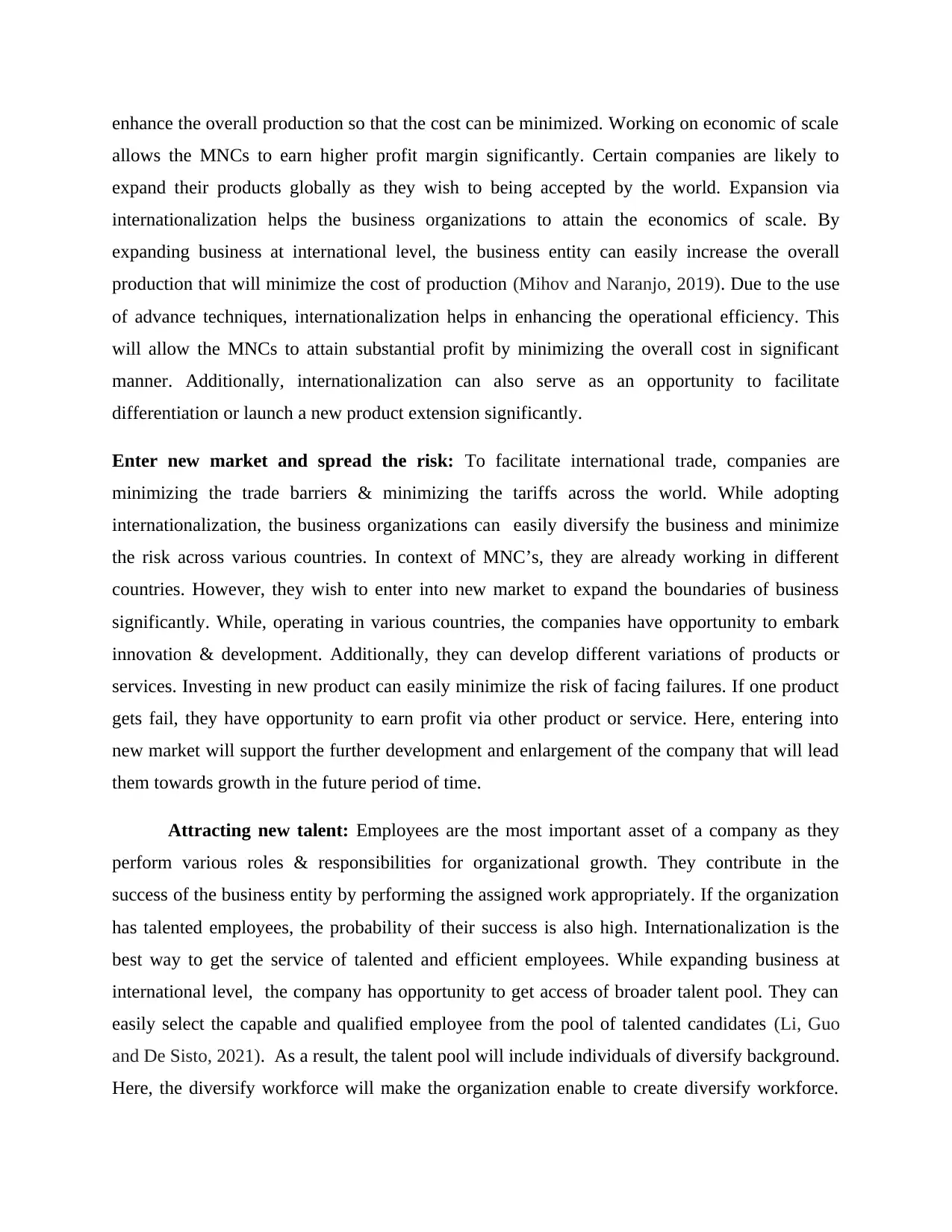
enhance the overall production so that the cost can be minimized. Working on economic of scale
allows the MNCs to earn higher profit margin significantly. Certain companies are likely to
expand their products globally as they wish to being accepted by the world. Expansion via
internationalization helps the business organizations to attain the economics of scale. By
expanding business at international level, the business entity can easily increase the overall
production that will minimize the cost of production (Mihov and Naranjo, 2019). Due to the use
of advance techniques, internationalization helps in enhancing the operational efficiency. This
will allow the MNCs to attain substantial profit by minimizing the overall cost in significant
manner. Additionally, internationalization can also serve as an opportunity to facilitate
differentiation or launch a new product extension significantly.
Enter new market and spread the risk: To facilitate international trade, companies are
minimizing the trade barriers & minimizing the tariffs across the world. While adopting
internationalization, the business organizations can easily diversify the business and minimize
the risk across various countries. In context of MNC’s, they are already working in different
countries. However, they wish to enter into new market to expand the boundaries of business
significantly. While, operating in various countries, the companies have opportunity to embark
innovation & development. Additionally, they can develop different variations of products or
services. Investing in new product can easily minimize the risk of facing failures. If one product
gets fail, they have opportunity to earn profit via other product or service. Here, entering into
new market will support the further development and enlargement of the company that will lead
them towards growth in the future period of time.
Attracting new talent: Employees are the most important asset of a company as they
perform various roles & responsibilities for organizational growth. They contribute in the
success of the business entity by performing the assigned work appropriately. If the organization
has talented employees, the probability of their success is also high. Internationalization is the
best way to get the service of talented and efficient employees. While expanding business at
international level, the company has opportunity to get access of broader talent pool. They can
easily select the capable and qualified employee from the pool of talented candidates (Li, Guo
and De Sisto, 2021). As a result, the talent pool will include individuals of diversify background.
Here, the diversify workforce will make the organization enable to create diversify workforce.
allows the MNCs to earn higher profit margin significantly. Certain companies are likely to
expand their products globally as they wish to being accepted by the world. Expansion via
internationalization helps the business organizations to attain the economics of scale. By
expanding business at international level, the business entity can easily increase the overall
production that will minimize the cost of production (Mihov and Naranjo, 2019). Due to the use
of advance techniques, internationalization helps in enhancing the operational efficiency. This
will allow the MNCs to attain substantial profit by minimizing the overall cost in significant
manner. Additionally, internationalization can also serve as an opportunity to facilitate
differentiation or launch a new product extension significantly.
Enter new market and spread the risk: To facilitate international trade, companies are
minimizing the trade barriers & minimizing the tariffs across the world. While adopting
internationalization, the business organizations can easily diversify the business and minimize
the risk across various countries. In context of MNC’s, they are already working in different
countries. However, they wish to enter into new market to expand the boundaries of business
significantly. While, operating in various countries, the companies have opportunity to embark
innovation & development. Additionally, they can develop different variations of products or
services. Investing in new product can easily minimize the risk of facing failures. If one product
gets fail, they have opportunity to earn profit via other product or service. Here, entering into
new market will support the further development and enlargement of the company that will lead
them towards growth in the future period of time.
Attracting new talent: Employees are the most important asset of a company as they
perform various roles & responsibilities for organizational growth. They contribute in the
success of the business entity by performing the assigned work appropriately. If the organization
has talented employees, the probability of their success is also high. Internationalization is the
best way to get the service of talented and efficient employees. While expanding business at
international level, the company has opportunity to get access of broader talent pool. They can
easily select the capable and qualified employee from the pool of talented candidates (Li, Guo
and De Sisto, 2021). As a result, the talent pool will include individuals of diversify background.
Here, the diversify workforce will make the organization enable to create diversify workforce.
⊘ This is a preview!⊘
Do you want full access?
Subscribe today to unlock all pages.

Trusted by 1+ million students worldwide
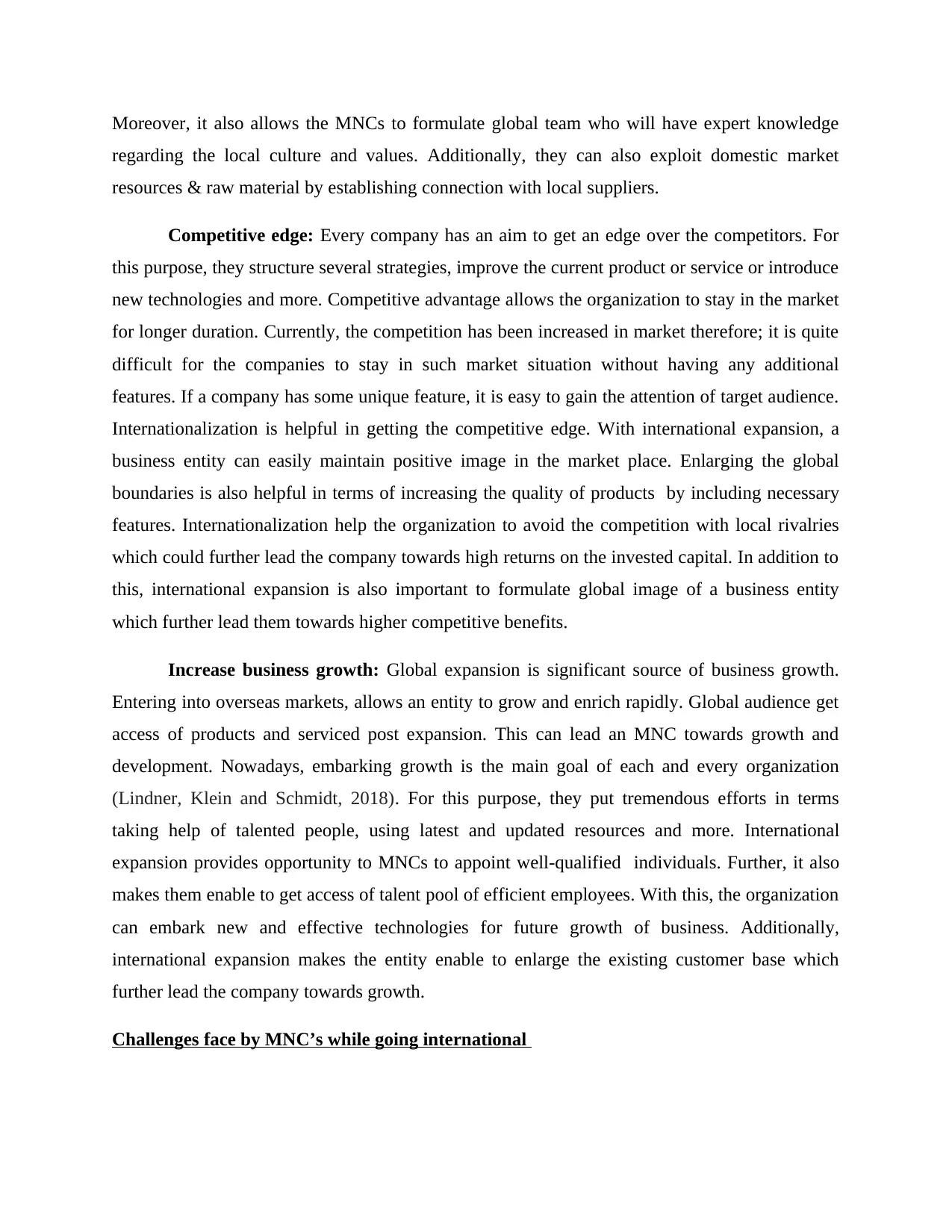
Moreover, it also allows the MNCs to formulate global team who will have expert knowledge
regarding the local culture and values. Additionally, they can also exploit domestic market
resources & raw material by establishing connection with local suppliers.
Competitive edge: Every company has an aim to get an edge over the competitors. For
this purpose, they structure several strategies, improve the current product or service or introduce
new technologies and more. Competitive advantage allows the organization to stay in the market
for longer duration. Currently, the competition has been increased in market therefore; it is quite
difficult for the companies to stay in such market situation without having any additional
features. If a company has some unique feature, it is easy to gain the attention of target audience.
Internationalization is helpful in getting the competitive edge. With international expansion, a
business entity can easily maintain positive image in the market place. Enlarging the global
boundaries is also helpful in terms of increasing the quality of products by including necessary
features. Internationalization help the organization to avoid the competition with local rivalries
which could further lead the company towards high returns on the invested capital. In addition to
this, international expansion is also important to formulate global image of a business entity
which further lead them towards higher competitive benefits.
Increase business growth: Global expansion is significant source of business growth.
Entering into overseas markets, allows an entity to grow and enrich rapidly. Global audience get
access of products and serviced post expansion. This can lead an MNC towards growth and
development. Nowadays, embarking growth is the main goal of each and every organization
(Lindner, Klein and Schmidt, 2018). For this purpose, they put tremendous efforts in terms
taking help of talented people, using latest and updated resources and more. International
expansion provides opportunity to MNCs to appoint well-qualified individuals. Further, it also
makes them enable to get access of talent pool of efficient employees. With this, the organization
can embark new and effective technologies for future growth of business. Additionally,
international expansion makes the entity enable to enlarge the existing customer base which
further lead the company towards growth.
Challenges face by MNC’s while going international
regarding the local culture and values. Additionally, they can also exploit domestic market
resources & raw material by establishing connection with local suppliers.
Competitive edge: Every company has an aim to get an edge over the competitors. For
this purpose, they structure several strategies, improve the current product or service or introduce
new technologies and more. Competitive advantage allows the organization to stay in the market
for longer duration. Currently, the competition has been increased in market therefore; it is quite
difficult for the companies to stay in such market situation without having any additional
features. If a company has some unique feature, it is easy to gain the attention of target audience.
Internationalization is helpful in getting the competitive edge. With international expansion, a
business entity can easily maintain positive image in the market place. Enlarging the global
boundaries is also helpful in terms of increasing the quality of products by including necessary
features. Internationalization help the organization to avoid the competition with local rivalries
which could further lead the company towards high returns on the invested capital. In addition to
this, international expansion is also important to formulate global image of a business entity
which further lead them towards higher competitive benefits.
Increase business growth: Global expansion is significant source of business growth.
Entering into overseas markets, allows an entity to grow and enrich rapidly. Global audience get
access of products and serviced post expansion. This can lead an MNC towards growth and
development. Nowadays, embarking growth is the main goal of each and every organization
(Lindner, Klein and Schmidt, 2018). For this purpose, they put tremendous efforts in terms
taking help of talented people, using latest and updated resources and more. International
expansion provides opportunity to MNCs to appoint well-qualified individuals. Further, it also
makes them enable to get access of talent pool of efficient employees. With this, the organization
can embark new and effective technologies for future growth of business. Additionally,
international expansion makes the entity enable to enlarge the existing customer base which
further lead the company towards growth.
Challenges face by MNC’s while going international
Paraphrase This Document
Need a fresh take? Get an instant paraphrase of this document with our AI Paraphraser
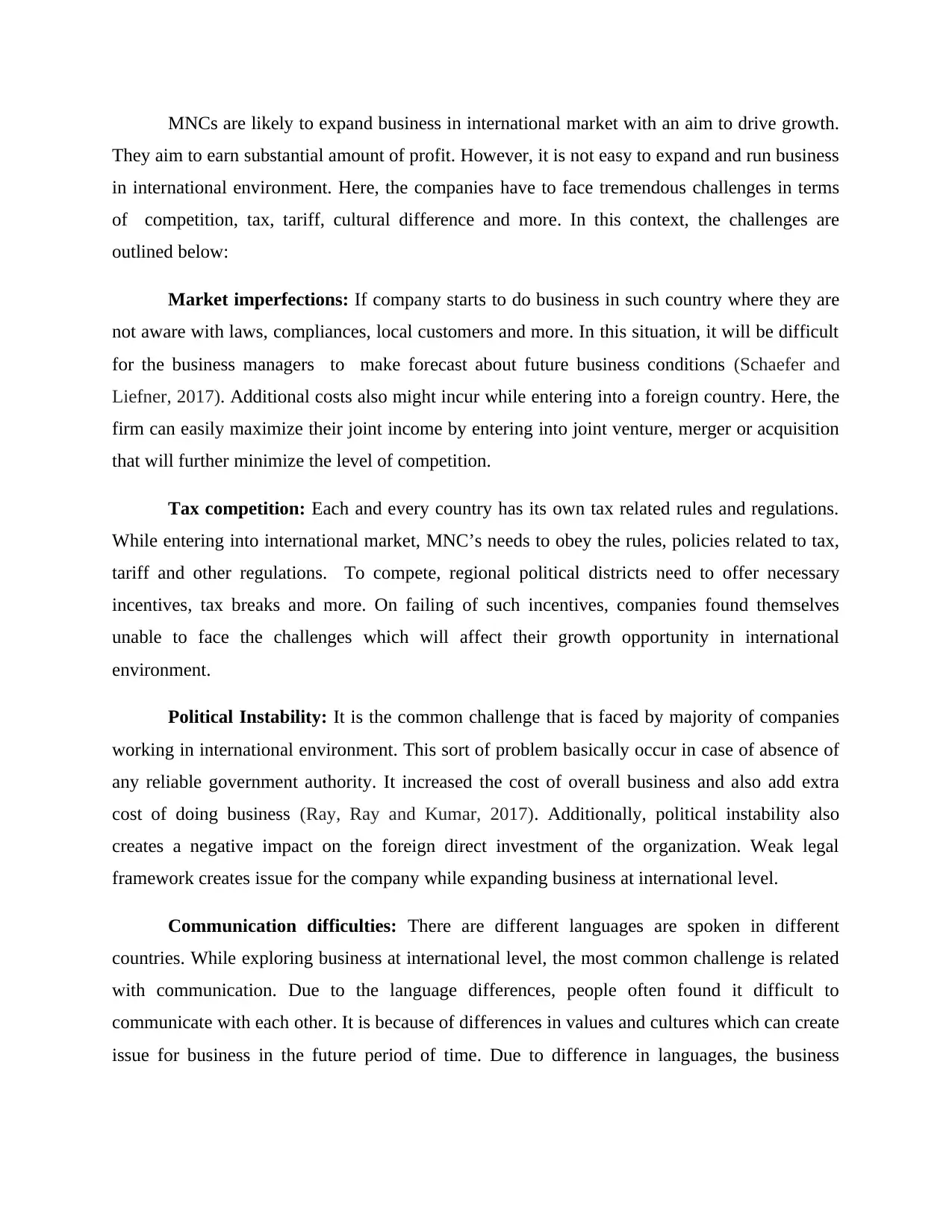
MNCs are likely to expand business in international market with an aim to drive growth.
They aim to earn substantial amount of profit. However, it is not easy to expand and run business
in international environment. Here, the companies have to face tremendous challenges in terms
of competition, tax, tariff, cultural difference and more. In this context, the challenges are
outlined below:
Market imperfections: If company starts to do business in such country where they are
not aware with laws, compliances, local customers and more. In this situation, it will be difficult
for the business managers to make forecast about future business conditions (Schaefer and
Liefner, 2017). Additional costs also might incur while entering into a foreign country. Here, the
firm can easily maximize their joint income by entering into joint venture, merger or acquisition
that will further minimize the level of competition.
Tax competition: Each and every country has its own tax related rules and regulations.
While entering into international market, MNC’s needs to obey the rules, policies related to tax,
tariff and other regulations. To compete, regional political districts need to offer necessary
incentives, tax breaks and more. On failing of such incentives, companies found themselves
unable to face the challenges which will affect their growth opportunity in international
environment.
Political Instability: It is the common challenge that is faced by majority of companies
working in international environment. This sort of problem basically occur in case of absence of
any reliable government authority. It increased the cost of overall business and also add extra
cost of doing business (Ray, Ray and Kumar, 2017). Additionally, political instability also
creates a negative impact on the foreign direct investment of the organization. Weak legal
framework creates issue for the company while expanding business at international level.
Communication difficulties: There are different languages are spoken in different
countries. While exploring business at international level, the most common challenge is related
with communication. Due to the language differences, people often found it difficult to
communicate with each other. It is because of differences in values and cultures which can create
issue for business in the future period of time. Due to difference in languages, the business
They aim to earn substantial amount of profit. However, it is not easy to expand and run business
in international environment. Here, the companies have to face tremendous challenges in terms
of competition, tax, tariff, cultural difference and more. In this context, the challenges are
outlined below:
Market imperfections: If company starts to do business in such country where they are
not aware with laws, compliances, local customers and more. In this situation, it will be difficult
for the business managers to make forecast about future business conditions (Schaefer and
Liefner, 2017). Additional costs also might incur while entering into a foreign country. Here, the
firm can easily maximize their joint income by entering into joint venture, merger or acquisition
that will further minimize the level of competition.
Tax competition: Each and every country has its own tax related rules and regulations.
While entering into international market, MNC’s needs to obey the rules, policies related to tax,
tariff and other regulations. To compete, regional political districts need to offer necessary
incentives, tax breaks and more. On failing of such incentives, companies found themselves
unable to face the challenges which will affect their growth opportunity in international
environment.
Political Instability: It is the common challenge that is faced by majority of companies
working in international environment. This sort of problem basically occur in case of absence of
any reliable government authority. It increased the cost of overall business and also add extra
cost of doing business (Ray, Ray and Kumar, 2017). Additionally, political instability also
creates a negative impact on the foreign direct investment of the organization. Weak legal
framework creates issue for the company while expanding business at international level.
Communication difficulties: There are different languages are spoken in different
countries. While exploring business at international level, the most common challenge is related
with communication. Due to the language differences, people often found it difficult to
communicate with each other. It is because of differences in values and cultures which can create
issue for business in the future period of time. Due to difference in languages, the business
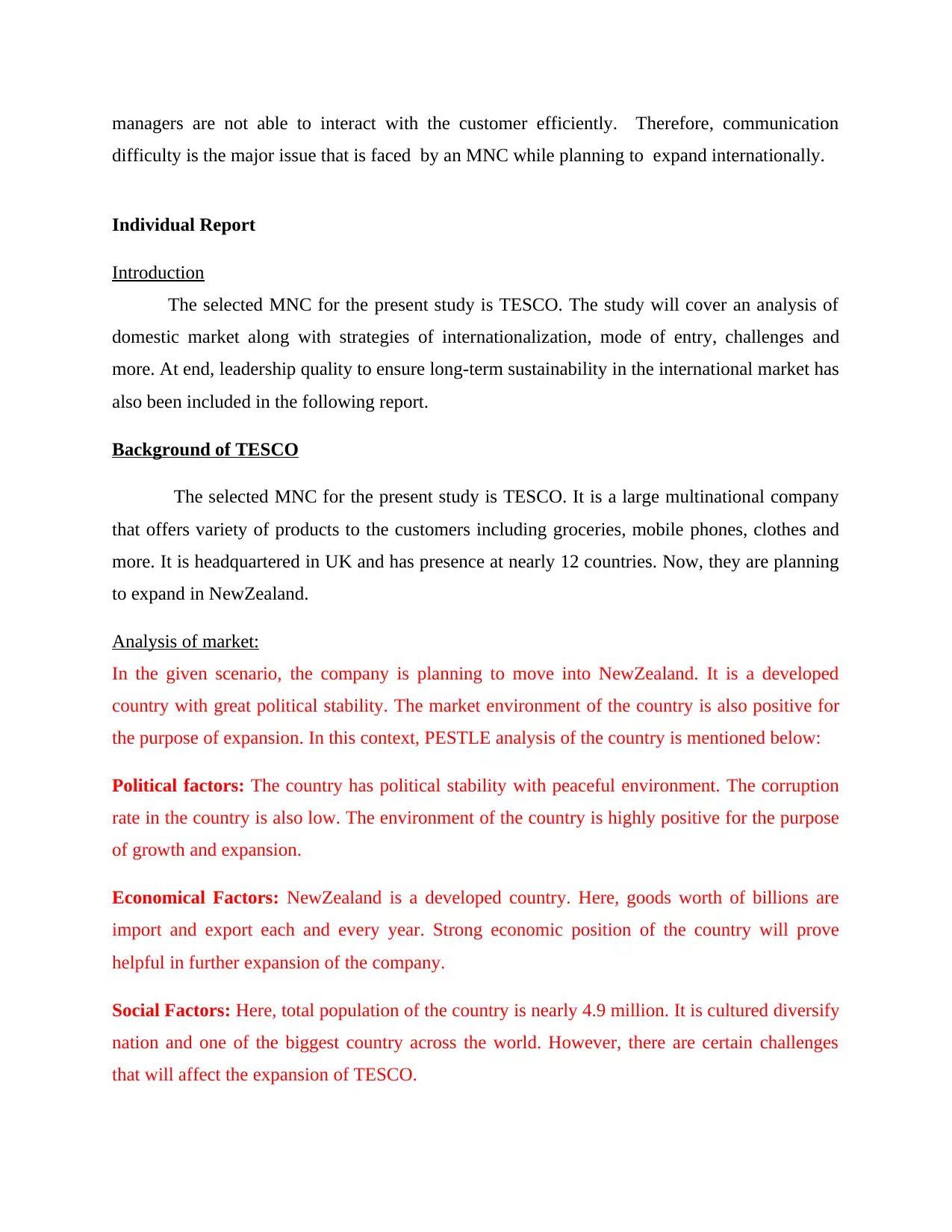
managers are not able to interact with the customer efficiently. Therefore, communication
difficulty is the major issue that is faced by an MNC while planning to expand internationally.
Individual Report
Introduction
The selected MNC for the present study is TESCO. The study will cover an analysis of
domestic market along with strategies of internationalization, mode of entry, challenges and
more. At end, leadership quality to ensure long-term sustainability in the international market has
also been included in the following report.
Background of TESCO
The selected MNC for the present study is TESCO. It is a large multinational company
that offers variety of products to the customers including groceries, mobile phones, clothes and
more. It is headquartered in UK and has presence at nearly 12 countries. Now, they are planning
to expand in NewZealand.
Analysis of market:
In the given scenario, the company is planning to move into NewZealand. It is a developed
country with great political stability. The market environment of the country is also positive for
the purpose of expansion. In this context, PESTLE analysis of the country is mentioned below:
Political factors: The country has political stability with peaceful environment. The corruption
rate in the country is also low. The environment of the country is highly positive for the purpose
of growth and expansion.
Economical Factors: NewZealand is a developed country. Here, goods worth of billions are
import and export each and every year. Strong economic position of the country will prove
helpful in further expansion of the company.
Social Factors: Here, total population of the country is nearly 4.9 million. It is cultured diversify
nation and one of the biggest country across the world. However, there are certain challenges
that will affect the expansion of TESCO.
difficulty is the major issue that is faced by an MNC while planning to expand internationally.
Individual Report
Introduction
The selected MNC for the present study is TESCO. The study will cover an analysis of
domestic market along with strategies of internationalization, mode of entry, challenges and
more. At end, leadership quality to ensure long-term sustainability in the international market has
also been included in the following report.
Background of TESCO
The selected MNC for the present study is TESCO. It is a large multinational company
that offers variety of products to the customers including groceries, mobile phones, clothes and
more. It is headquartered in UK and has presence at nearly 12 countries. Now, they are planning
to expand in NewZealand.
Analysis of market:
In the given scenario, the company is planning to move into NewZealand. It is a developed
country with great political stability. The market environment of the country is also positive for
the purpose of expansion. In this context, PESTLE analysis of the country is mentioned below:
Political factors: The country has political stability with peaceful environment. The corruption
rate in the country is also low. The environment of the country is highly positive for the purpose
of growth and expansion.
Economical Factors: NewZealand is a developed country. Here, goods worth of billions are
import and export each and every year. Strong economic position of the country will prove
helpful in further expansion of the company.
Social Factors: Here, total population of the country is nearly 4.9 million. It is cultured diversify
nation and one of the biggest country across the world. However, there are certain challenges
that will affect the expansion of TESCO.
⊘ This is a preview!⊘
Do you want full access?
Subscribe today to unlock all pages.

Trusted by 1+ million students worldwide
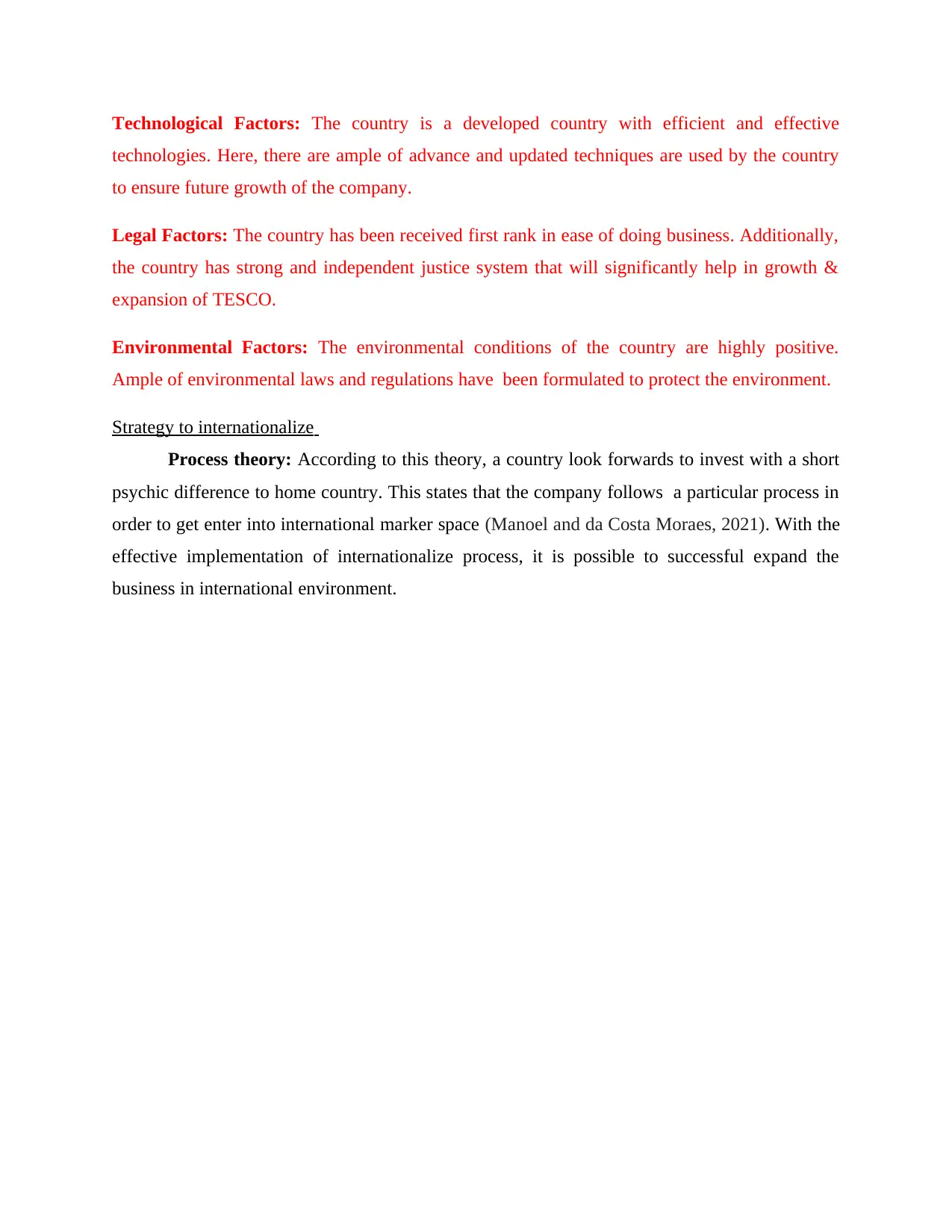
Technological Factors: The country is a developed country with efficient and effective
technologies. Here, there are ample of advance and updated techniques are used by the country
to ensure future growth of the company.
Legal Factors: The country has been received first rank in ease of doing business. Additionally,
the country has strong and independent justice system that will significantly help in growth &
expansion of TESCO.
Environmental Factors: The environmental conditions of the country are highly positive.
Ample of environmental laws and regulations have been formulated to protect the environment.
Strategy to internationalize
Process theory: According to this theory, a country look forwards to invest with a short
psychic difference to home country. This states that the company follows a particular process in
order to get enter into international marker space (Manoel and da Costa Moraes, 2021). With the
effective implementation of internationalize process, it is possible to successful expand the
business in international environment.
technologies. Here, there are ample of advance and updated techniques are used by the country
to ensure future growth of the company.
Legal Factors: The country has been received first rank in ease of doing business. Additionally,
the country has strong and independent justice system that will significantly help in growth &
expansion of TESCO.
Environmental Factors: The environmental conditions of the country are highly positive.
Ample of environmental laws and regulations have been formulated to protect the environment.
Strategy to internationalize
Process theory: According to this theory, a country look forwards to invest with a short
psychic difference to home country. This states that the company follows a particular process in
order to get enter into international marker space (Manoel and da Costa Moraes, 2021). With the
effective implementation of internationalize process, it is possible to successful expand the
business in international environment.
Paraphrase This Document
Need a fresh take? Get an instant paraphrase of this document with our AI Paraphraser
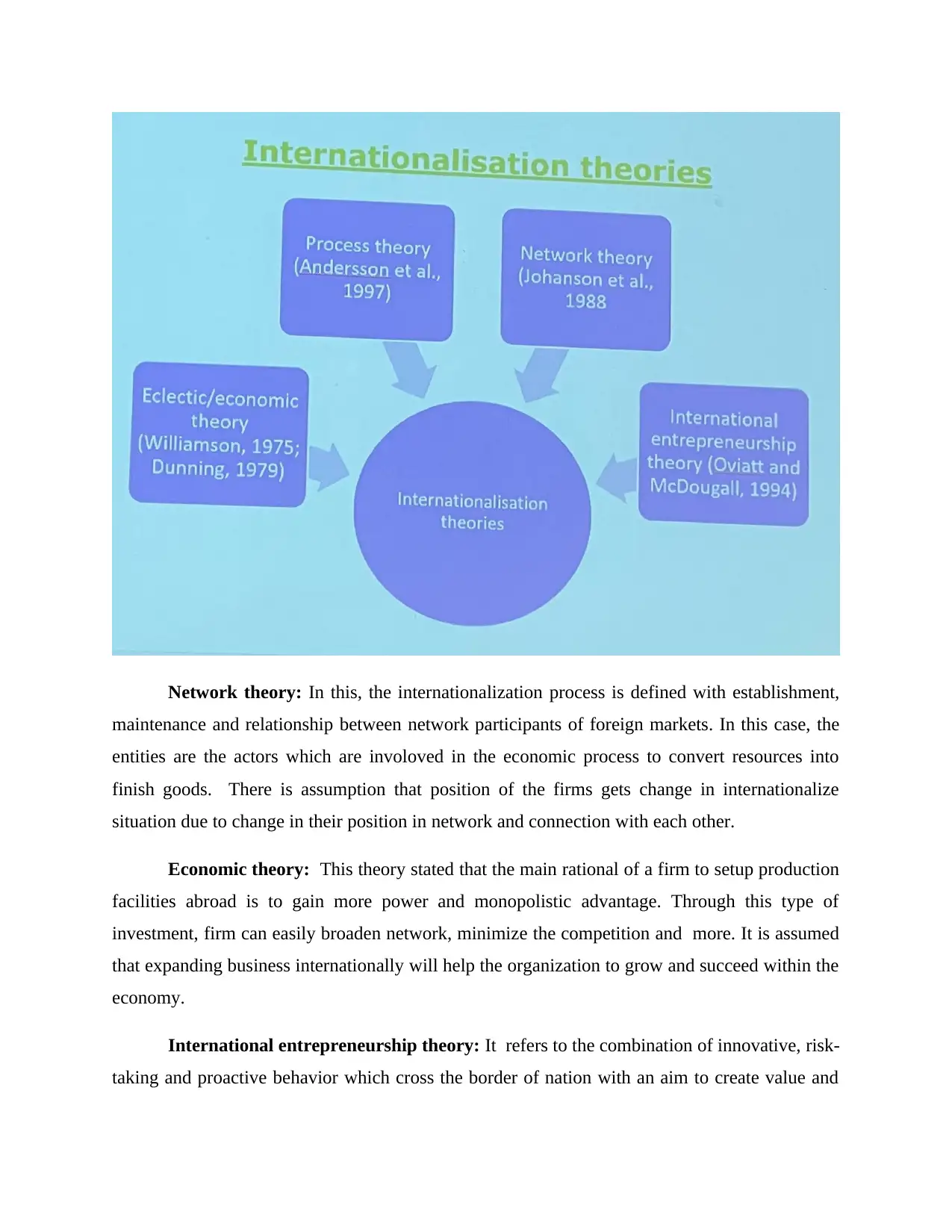
Network theory: In this, the internationalization process is defined with establishment,
maintenance and relationship between network participants of foreign markets. In this case, the
entities are the actors which are involoved in the economic process to convert resources into
finish goods. There is assumption that position of the firms gets change in internationalize
situation due to change in their position in network and connection with each other.
Economic theory: This theory stated that the main rational of a firm to setup production
facilities abroad is to gain more power and monopolistic advantage. Through this type of
investment, firm can easily broaden network, minimize the competition and more. It is assumed
that expanding business internationally will help the organization to grow and succeed within the
economy.
International entrepreneurship theory: It refers to the combination of innovative, risk-
taking and proactive behavior which cross the border of nation with an aim to create value and
maintenance and relationship between network participants of foreign markets. In this case, the
entities are the actors which are involoved in the economic process to convert resources into
finish goods. There is assumption that position of the firms gets change in internationalize
situation due to change in their position in network and connection with each other.
Economic theory: This theory stated that the main rational of a firm to setup production
facilities abroad is to gain more power and monopolistic advantage. Through this type of
investment, firm can easily broaden network, minimize the competition and more. It is assumed
that expanding business internationally will help the organization to grow and succeed within the
economy.
International entrepreneurship theory: It refers to the combination of innovative, risk-
taking and proactive behavior which cross the border of nation with an aim to create value and
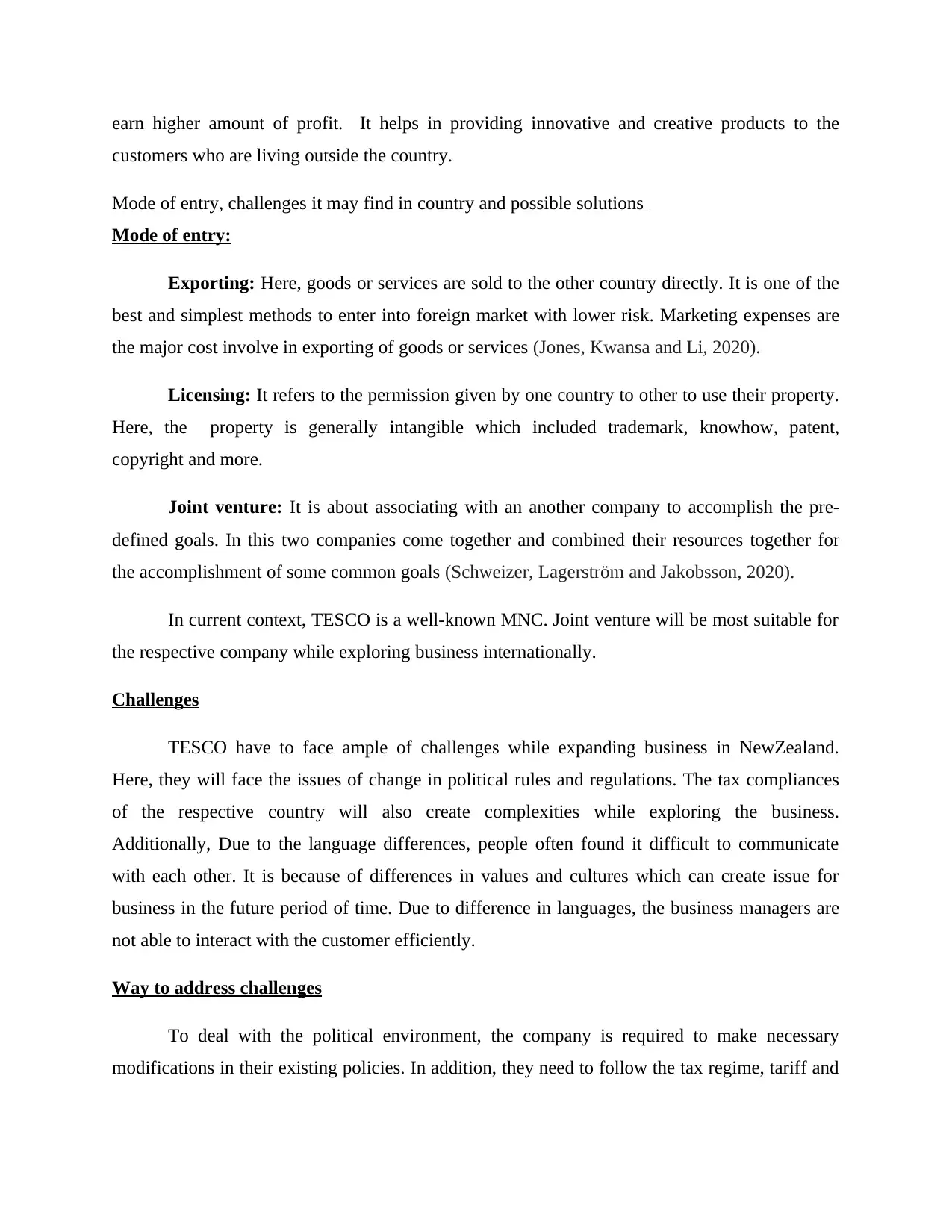
earn higher amount of profit. It helps in providing innovative and creative products to the
customers who are living outside the country.
Mode of entry, challenges it may find in country and possible solutions
Mode of entry:
Exporting: Here, goods or services are sold to the other country directly. It is one of the
best and simplest methods to enter into foreign market with lower risk. Marketing expenses are
the major cost involve in exporting of goods or services (Jones, Kwansa and Li, 2020).
Licensing: It refers to the permission given by one country to other to use their property.
Here, the property is generally intangible which included trademark, knowhow, patent,
copyright and more.
Joint venture: It is about associating with an another company to accomplish the pre-
defined goals. In this two companies come together and combined their resources together for
the accomplishment of some common goals (Schweizer, Lagerström and Jakobsson, 2020).
In current context, TESCO is a well-known MNC. Joint venture will be most suitable for
the respective company while exploring business internationally.
Challenges
TESCO have to face ample of challenges while expanding business in NewZealand.
Here, they will face the issues of change in political rules and regulations. The tax compliances
of the respective country will also create complexities while exploring the business.
Additionally, Due to the language differences, people often found it difficult to communicate
with each other. It is because of differences in values and cultures which can create issue for
business in the future period of time. Due to difference in languages, the business managers are
not able to interact with the customer efficiently.
Way to address challenges
To deal with the political environment, the company is required to make necessary
modifications in their existing policies. In addition, they need to follow the tax regime, tariff and
customers who are living outside the country.
Mode of entry, challenges it may find in country and possible solutions
Mode of entry:
Exporting: Here, goods or services are sold to the other country directly. It is one of the
best and simplest methods to enter into foreign market with lower risk. Marketing expenses are
the major cost involve in exporting of goods or services (Jones, Kwansa and Li, 2020).
Licensing: It refers to the permission given by one country to other to use their property.
Here, the property is generally intangible which included trademark, knowhow, patent,
copyright and more.
Joint venture: It is about associating with an another company to accomplish the pre-
defined goals. In this two companies come together and combined their resources together for
the accomplishment of some common goals (Schweizer, Lagerström and Jakobsson, 2020).
In current context, TESCO is a well-known MNC. Joint venture will be most suitable for
the respective company while exploring business internationally.
Challenges
TESCO have to face ample of challenges while expanding business in NewZealand.
Here, they will face the issues of change in political rules and regulations. The tax compliances
of the respective country will also create complexities while exploring the business.
Additionally, Due to the language differences, people often found it difficult to communicate
with each other. It is because of differences in values and cultures which can create issue for
business in the future period of time. Due to difference in languages, the business managers are
not able to interact with the customer efficiently.
Way to address challenges
To deal with the political environment, the company is required to make necessary
modifications in their existing policies. In addition, they need to follow the tax regime, tariff and
⊘ This is a preview!⊘
Do you want full access?
Subscribe today to unlock all pages.

Trusted by 1+ million students worldwide
1 out of 18
Related Documents
Your All-in-One AI-Powered Toolkit for Academic Success.
+13062052269
info@desklib.com
Available 24*7 on WhatsApp / Email
![[object Object]](/_next/static/media/star-bottom.7253800d.svg)
Unlock your academic potential
Copyright © 2020–2026 A2Z Services. All Rights Reserved. Developed and managed by ZUCOL.





